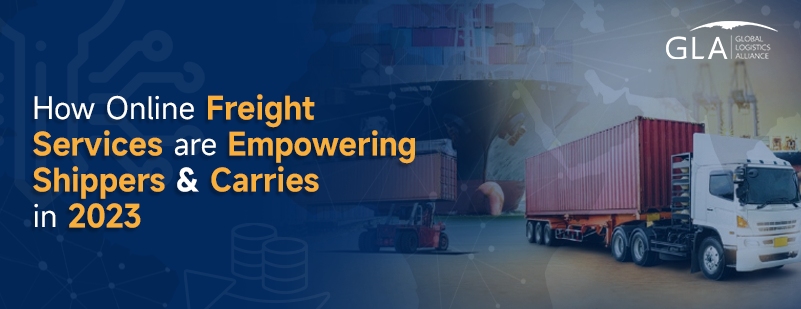Time:2023-12-11 Publisher:Kevin Num:6518

The smooth movement of goods is the backbone of the global economy, and the freight industry plays a pivotal role in ensuring this seamless flow of goods and services. Recent years have been witness to a remarkable transformation in the sector, with online freight services taking center stage. Far more than mere conveniences, these services are the driving force behind the empowerment of both shippers and carriers.
In an increasingly interconnected world, the demand for efficient logistics solutions has skyrocketed. Online freight services have emerged as the answer to this pressing demand, effectively revolutionizing age-old practices. They have ushered in an era marked by efficiency, transparency, and precision—an industry renowned for its intricacies.
Shippers and carriers are now reaping the benefits of this digital transformation in the freight sector. Shippers can effortlessly tap into an extensive network of carriers, granting them access to competitive pricing, real-time tracking capabilities, and unprecedented control over their shipments. Simultaneously, carriers can optimize their routes, reduce empty hauls, bolster profitability, and minimize their environmental footprint.
The empowerment of shippers and carriers through online freight services is reshaping the industry, fueling innovation, fostering sustainability, and propelling economic growth on a global scale. In the forthcoming sections, we will delve into the myriad advantages and the evolving landscape of online freight services, illuminating their central role in shaping the future of the freight industry in 2023 and beyond.
The Transformative Landscape of Freight Services:
In the ever-evolving realm of logistics and transportation, the year 2023 stands witness to a seismic shift in the management and execution of freight services. The advent of online freight services has engendered a revolutionary transformation, effectively redefining traditional industry paradigms. Let us embark on this transformative journey and explore how it is empowering both shippers and carriers.
Traditional Methods and Their Shortcomings:
Traditionally, the management of freight operations was a labyrinthine and cumbersome process. It involved a multitude of telephone calls, paperwork, and intermediaries, which invariably led to delays, errors, and increased costs. The absence of real-time visibility into shipments frequently resulted in inefficiencies and frustrated stakeholders. Moreover, the industry grappled with the challenges of route optimization and minimizing empty cargo space, contributing to environmental concerns.
Digital Transformation and Technological Advancements:
Fast forward to 2023, and we bear witness to a remarkable digital transformation within the freight industry. Cutting-edge technologies such as Artificial Intelligence (AI), the Internet of Things (IoT), and blockchain have become integral, providing real-time data, predictive analytics, and fortified security. This tech-driven shift has not only elevated operational efficiency but has also substantially curtailed human errors and enhanced decision-making processes.
The Emergence of Online Freight Services:
Online freight services have emerged as the game-changer in logistics and freight landscape. These platforms serve as digital marketplaces, directly connecting shippers with carriers, effectively eliminating intermediaries and reducing costs.
Shippers can effortlessly access a pool of carriers, compare rates, track shipments in real time, and make data-driven decisions. Carriers, in turn, benefit from heightened visibility, more efficient route optimization, and access to a broader customer base.
Online Freight Services Facilitate Shippers to access an Extensive Carrier Network:
In the perpetually evolving landscape of logistics and transportation, the year 2023 has borne witness to a profound shift in the operations of both shippers and carriers.
At the heart of this transformative journey lies the pivotal role played by online freight services. In this section, we delve into the second key benefit these platforms offer Access to a Wider Network.
Connecting Shippers with a Diverse Array of Carriers:
Traditionally, shippers were constrained by geographical limitations when seeking carriers for their cargo. However, the rise of online freight services has obliterated these boundaries. These platforms serve as dynamic marketplaces where shippers can seamlessly connect with a diverse array of carriers, spanning regions and specialties. Whether it's local deliveries or international shipping, the possibilities have expanded exponentially.
The Advantages of a Competitive Marketplace for Freight Rates:
One of the most compelling advantages of these online platforms is the creation of a competitive marketplace. Shippers can now receive multiple quotes from carriers, promoting transparency and driving down costs. This results in competitive freight rates that are beneficial for both parties, a stark departure from the opaque pricing structures of the past.
Success Stories of Shippers Expanding Their Reach:
The success stories emerging from this paradigm shift are nothing short of inspiring. Shippers are discovering new partners who perfectly align with their unique requirements. Small and medium-sized enterprises (SMEs), in particular, have seen substantial growth as they tap into previously untapped markets. With the help of online freight services, they are establishing relationships with carriers that cater to niche industries and remote areas, broadening their horizons like never before.
Expanded Business Opportunities:
Online freight platforms have dismantled geographical barriers, granting carriers access to a vast and diverse customer base. Through these platforms, carriers can connect with shippers from across the globe, opening up a world of opportunities. Load boards and bidding systems are at the core of this expansion.
Carriers can view available shipments, assess their profitability, and bid competitively. This transparent marketplace fosters healthy competition, ensuring fair rates for services. Success stories abound, with carriers discovering profitable routes and forging lasting partnerships, all thanks to the reach of online freight services.
Efficiency forms the lifeblood of carriers, and online platforms provide a transfusion of benefits. Route optimization and load-matching algorithms are revolutionizing the way carriers operate. Carriers can minimize empty miles, reduce fuel consumption, and enhance overall efficiency by leveraging these intelligent tools.
Real-time communication with shippers is another game-changer, enabling carriers to adapt swiftly to changing circumstances. It streamlines operations, leading to shorter delivery times and greater customer satisfaction.
Digital Documentation and Compliance:
Navigating the world of paperwork and compliance can be a daunting task for carriers. However, online freight services are significantly simplifying these administrative burdens. Digital documentation eliminates the need for mountains of paperwork, reducing the risk of errors and delays. Moreover, compliance with ever-evolving regulations is paramount in the logistics industry. Online services provide carriers with the latest information and tools to effortlessly stay compliant. This not only saves time but also prevents costly penalties.
Challenges and Considerations:
Online freight services have unquestionably revolutionized the logistics landscape, bestowing a multitude of benefits upon both shippers and carriers. Nevertheless, this transformative journey is not without its share of challenges and considerations.
Foremost among these concerns is the issue of security and data privacy. As businesses increasingly rely on digital platforms to manage their freight operations, the vulnerability to cyber threats and data breaches looms larger.
Shippers and carriers must recognize the significance of robust cybersecurity measures in safeguarding sensitive information, preserving trust, and ensuring the uninterrupted flow of operations.
Future Trends in Online Freight Services:
Peering into the horizon, the future of online freight services is adorned with promising trends. Emerging technologies such as blockchain and IoT are poised to further disrupt the industry. These innovations hold the promise of enhanced transparency, traceability, and efficiency, equipping shippers and carriers with novel tools to optimize their operations.
Moreover, sustainability and green logistics are gaining prominence. As environmental concerns become more critical, businesses are increasingly prioritizing eco-friendly transportation solutions. Online freight services are facilitating this shift, enabling the reduction of carbon footprints through optimized routes and modal choices.
Speculating on the industry's evolution beyond 2023, we can anticipate even more sophisticated automation, AI-driven decision-making, and interconnected logistics ecosystems.
Conclusion:
In conclusion, online freight services will empower shippers and carriers in 2023 and beyond. While challenges such as security and data privacy persist, the industry's future is replete with promise. Emerging technologies, sustainability initiatives, and real-world success stories illustrate the transformative power of these services. Shippers and carriers are strongly encouraged to embrace this digital evolution to remain competitive in the ever-evolving freight landscape.



